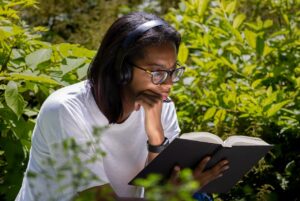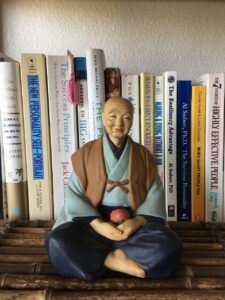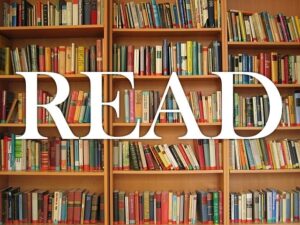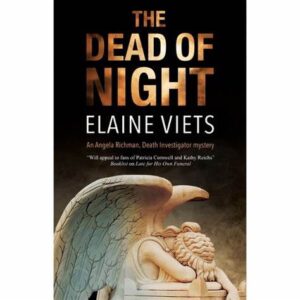 By Elaine Viets
By Elaine Viets
Reading is good for you.
That’s right. Reading is healthier than a bale of kale, according to the studies I’ve seen. Here’s a rundown on some:

Reading can help keep your brain sharp.
Can’t do Sudoku? Me, either.
But I do read. And a 14-year study of almost 2,000 people in Taiwan who were 64 and older, showed those who read one or more times a week had less cognitive decline at six-and 14-year intervals.

Wanna live longer? Read.
Here’s a novel idea. Books are better for you than magazines and newspapers.
“Book readers also experienced a 20% reduction in risk of mortality over the 12 years of follow-up compared to non-book readers,” said a study published in 2017. “These findings suggest that the benefits of reading books include a longer life in which to read them.”

Reading can improve your brain’s health.
According to Bustle. The newsletter said, “Scientists looking into a six-month daily reading study at Carnegie-Mellon discovered that the volume of white matter (that stuff responsible for carrying nerve impulses between neurons) in the language area of the brain actually increased.”

Stay connected.
Business Insider says reading strengthens the connections in your brain.
According to Sabrina Romanoff, an NYC clinical psychologist, “reading creates neurons in the brain, a process known as neurogenesis. Neurons are cells that send messages and transmit information between different areas in the brain.
“Reading material that requires thought, consideration, and effort to metabolize what’s being described leads to the creation of new neurons in your brain,” Romanoff says. “These neurons also increase new neuronal connections, both with each other and older networks, which accelerates processing speed.”

Six minutes.
Is all it takes to reduce stress. That’s according to researchers at the University of Sussex. They said, “People who read for just six minutes had reduced muscle tension and a slower heart rate.”

Tired of being told to eat your veggies?
A study of more than 15,000 Chinese age 65 years and older who didn’t have dementia were followed for about five years.
The study wanted to find out if intellectual activities could lower “the risk of dementia in older adults, independent of other healthy lifestyle practices such as regular physical exercise, adequate fruit and vegetable intake, and not smoking.”
The good news? “Daily participation in intellectual activities was associated with a significantly lower risk of dementia several years later, independent of other health behaviors, physical health limitations, and sociodemographic factors.”
In other words, “Active participation in intellectual activities, even in late life, might help prevent dementia in older adults.” And yes, intellectual activities include reading.
Pass the zucchini, please. To someone else.
***
 Stay smart and healthy! Enjoy The Dead of Night, my seventh Angela Richman, Death Investigator mystery. http://tinyurl.com/mr33sc8e
Stay smart and healthy! Enjoy The Dead of Night, my seventh Angela Richman, Death Investigator mystery. http://tinyurl.com/mr33sc8e

I just winked at my TBR pile.
Hahahaha!
Don’t forget to read it, Nana.
I’d read some of this before, but it’s always good to get a refresher…
Something I may have missed is that reading fiction is better than reading nonfiction – though historical nonfiction is better than technical nonfiction – and that “analog” is better than screen time, especially at night/bedtime when it comes to combating dementia and, in some cases, slowing Alzheimer’s…
Now, if I can just make sure to have a good thriller in the office to read during a coffee break after the commute and staff meetings at the day job…
I tend to alternate fiction and non-fiction. A steady diet of either starts to slow me down.
Alan, you have a well-balanced reading diet.
You are right, George. Analog is better for your brain, and fiction is better than non-fiction. Supposedly fiction promotes empathy.
I think non-fiction and history “require” recall of things that can be looked up in other sources, whereas fiction is typically, novel (if you’ll pardon the unintentional pun) and exercises the short-term memory.
History often carries some “long term” memory – from high school or college – associated with it some form or fashion…
But then, I’m no neuroscientist… I just write like one on TV…
LOL, George.
Thanks for this reassuring info, Elaine.
Now if I could just break the neuronal connection between reading and snacking, I’d be really healthy!
Kale chips? No, thank you.
I have a terrible time resisting chocolate while I read. I’ve read that dark chocolate is good for you, but you’re supposed to eat it in moderation. I want to be extra healthy.
Good to know I’ve been preparing for this since I was four.
Love studies like this, Elaine. Increasing one’s lifespan by twenty percent is a remarkable finding, as is six minutes. Good stuff!
“Book readers also experienced a 20% reduction in risk of mortality over the 12 years of follow-up compared to non-book readers,”
If I am curled up with my blanket and book I can’t fall down and break a hip.
Happy New Year.
You also won’t be skydiving.
Reading this post warms my librarian heart so much, Elaine. (Okay, technically retired librarian, but once a librarian, always a librarian 😉
Reading a couple of door-stopper histories of the First World War are definitely working my brain. The same for all the twisty mysteries I’ve been consuming, so I’m glad to hear there’s some data backing up my impressions.
No time with a book is ever wasted Dale. Or in a library.
Thanks, Elaine, for the info and reminders. Important and helpful.
During the evening news, I mute the commercials and read. That 3 a.m. wakefulness that is so common to many of us is a great time to read. And, as Alan said, “If I am curled up with a blanket and a book…” I’m not out with the crazies where death or injury lurks.
Read a book and let your mind wander, Steve. Stay safely at home.
Wonderful information, Elaine. Reading is the easiest and most pleasant way to stay (get) smart and healthy.
Sadly, the flip side of this, according to the Barbara Bush Foundation for Family Literacy, is that “130 million adults in the United States struggle to read basic sentences.” Your post should be required reading for everyone over the age of five.
That is sad news, Kay. And it’s hard to convince kids that reading is good for them.
Great news, Elaine! My hours-long reading habit began at age 8, so I should be in good “shape”. 🙂
Unfortunately, today’s humans often count texting as part of their reading quota. I know because I have many g-children; their parents have an uphill battle sometimes getting them to pick up a book.
I have a framed meme at my desk. It shows a picture of a teacher holding a book out to a student and saying: “It’s called reading. It’s how people install new software into their brains.”
I always place that meme prominently on my book tables at events. 🙂
Happy Thursday, all!
Love that meme, Deb. Another good thing about reading analogue books is I don’t have to shut the book until the plane reaches 30,000 feet.
I was raised in a household that didn’t have television because my parents disliked it intensely. About all the teevee I got was watching Mister District Attorney at my cousin’s when I finished my paper route in the afternoon. Looking back on it I don’t think missing Pinky Lee was a big negative.
But the folks did teach myself and my two sisters to read at an early age (around 3) and it has been a set of tools that has lasted a lifetime so far (75).
One of the things that always bothered me was people who’d dismissively say “Oh, I don’t read anything except repair manuals if I have to.”
Like, they’re saying “I’m not interested in ideas. I can’t be bothered.” And then they wonder why the world is the way it is.
On the other hand I had a conversation with a friend who had a bunch of relatives of that ilk. I wondered whether it bothered him and he said “No. The world needs more ignorant people to clean up our messes.”
Your parents gave you a gift, Robert. My parents restricted my TV watching to three hours a day.
Interesting information! I’ve always been a big reader and so is my younger daughter. My older daughter never liked it much until she started nursing school. I think the stress and pressure of it made her seek out something to distract herself with. She’s graduated now and still reading like crazy. Which is a good thing, right? 🙂
Definitely, Aymee. I’ve known a couple of people who started reading for fun once their textbook days were over.
This is all so fascinating, Elaine, and reassuring, too, because I love reading!
I feel the same way, Priscilla.
At 85 years old I think I already got my 20 % increase. I think my reading addiction got me through the pandemic. Reading has kept me sane.
Congratulations, Gail. Your addiction paid off. Keep on reading.